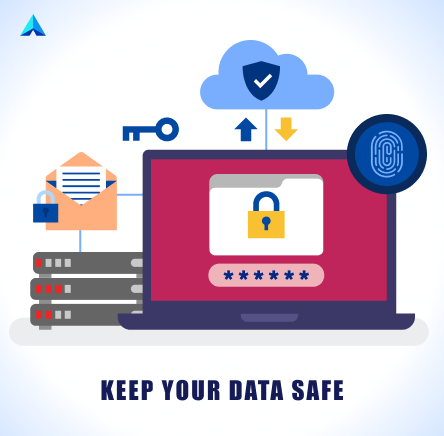
The Increasing Importance Of Mobile App & Website Security
Website and mobile app security have always been of great concern for businesses. But over the past several months, since the Coronavirus outbreak, its significance has increased by leaps and bounds. The pandemic has expedited the journey towards complete digital transformation for businesses, both large and small. Organisations today are under immense pressure to either build a new app and website or improve their existing one. At present, mobile apps and websites are not just used to connect with their new and existing audience effectively. But, it has become an absolute necessity.
However, the need and rush to gain an edge over the competitors, many companies often forget to prioritise certain specific aspects such as security. As you may already know, app and website security should always be on the top in the list of priorities.
As per the Verizon Mobile Security Index 2020, in 2019, 43% of companies intentionally cut costs on mobile security and 39% of the companies suffered security compromises. This data is from before the world was turned upside down by the global pandemic. So you can only expect the number to rise as the demand for the websites and mobile apps increase.
Cyberattacks Have Risen During The Pandemic
When it comes to cybersecurity, humans are often the weakest link. We see more and more people being targets of two types of cyberattacks to be precise. The first would be social engineering trying to circumvent a process you are using currently and exposes your inadequacy of security awareness. The second is logical engineering targeting a system or technology to detect vulnerable or obsolete software. Since the pandemic forced most of us to work remotely, protecting data has become more critical than ever. Not to forget, the increasing threats from cyberattacks both in severity and numbers has pushed organisations to face their digital readiness and address cyber threats head-on.
During the pandemic alone, there has been a 238% rise in cyber attacks on banks. Not to forget, phishing attacks have increased to approximately 600%. You will be surprised to know that around 80% of organisations worldwide have seen an uptick in cyberattacks this year.
Mobile apps and websites contain confidential consumer data, making it the easiest target for hackers. In fact, 78% of hackers admit that security used by many organisations is not enough for data protection. According to them, AI-powered cybersecurity solutions will not be enough to outmanoeuvre cyberattacks in the coming years.
Need For State Of The Art Mobile App & Website Security
Here are the key reasons why you should prioritise website and app security.
Safeguards Confidential Data
You can block hackers, as well as malware installations, by ensuring your website and app has most up to date security software. It also prevents you from clicking malicious web links usually camouflaged as legitimate ones. These links contain viruses, Trojans, and malware that can destroy or retrieve private data.
Provides Constant Software Patching Services
Software patching plays a crucial role in keeping confidential data safe at all times. They are responsible for covering security breaches to keep the hackers out. It will also prevent cyberattacks from causing significant damage to your business.
Protects You Against Malvertising
Malvertising or malicious advertising is the practice of online advertising to spread malware. It involves inserting malware-laden or malicious advertisements into genuine online advertising web pages and networks. It creates loopholes for hackers, making it easier for them to enter.
Prevents Your Phone and Desktop from Becoming Vulnerable to Malware
Advanced mobile app and website security will be able to inform you if viruses or malware has infected your device as well as the level of the impact. It will instantly delete particular kinds of viruses and malware, therefore stopping possible dangers or severe consequences.
Hacker Target Your Customers
Malicious software infects your websites or mobile app to gather data and, in some cases, even capture device resources. Hackers can also use it to redirect traffic and infect your visitors or users with malicious software. And this is often done by automated hacking tools. The hackers retarget your potential customers for their private data through your app and website.
So how do you ensure your mobile apps and websites are secure from cyberattacks?
We’ll now list a few techniques you can implement to ensure your app or website is secure in today’s fast-paced digital era.
4 Techniques To Ensure Your Mobile App And Website Is Secure
Use Secure Network
Website owners can make sure their data is protected at all times by using a secure network, for example, using a URL using HTTPS. Subscribe for an SSL certificate so that your website is not defenceless during cyberattacks. SSL is essential to prevent hackers from penetrating without a hassle. Additionally, the Security Token Service (STS) secures the validation process by verifying all authentications to complete the authentication process. Similarly, using an HttpOnly cookie overrides any third party/hacker from getting access to the client-side script, blocking attacks through cookies. HTTP Strict Transport Security, also known as the HSTS, is an enhanced security feature. It restricts a browser to interconnect with any specific domain over HTTP protocol, and only communicate over HTTPS.
Optimise Data Caching
Mobile devices usually store cached data to enhance the app’s performance. However, this is a cause of several issues as the apps and devices become more vulnerable to breaches and attacks. Hackers can easily decrypt the cached data, resulting in stolen user data. To reduce vulnerabilities associated with cached data, you can use authentication to access the application or website. You can even set up an automatic process to wipe cached data every time the device restarts.
Apply Two-Factor Authorisation
The two-factor authorisation is highly beneficial when a website identifies a different IP address used to login to your account like your Gmail. It immediately sends a text message to the registered phone number with a code to confirm if it is really you using the account. It helps you instantly find out if anyone else is trying to access your account with your credentials.
Prevent Data Leaks
The next thing you can do is avoid data leaks. You can ask your developers to use codes that prevent the intentional or unintentional discharge of secure information to any untrustworthy environment. It will still allow users to install apps on their devices. When you create secure mobile workspaces, it helps block malware from accessing the apps as well as stops hackers from copying, saving, or sharing sensitive data.
Build A Highly Secure Mobile App And Website
If you want to know more about the mobile app or website security concerns, you can speak to our team of seasoned developers. Additionally, we can also help you develop feature-rich, high-performance, and secure mobile apps and websites. Contact us for a free consultation.
 Blog
Blog


